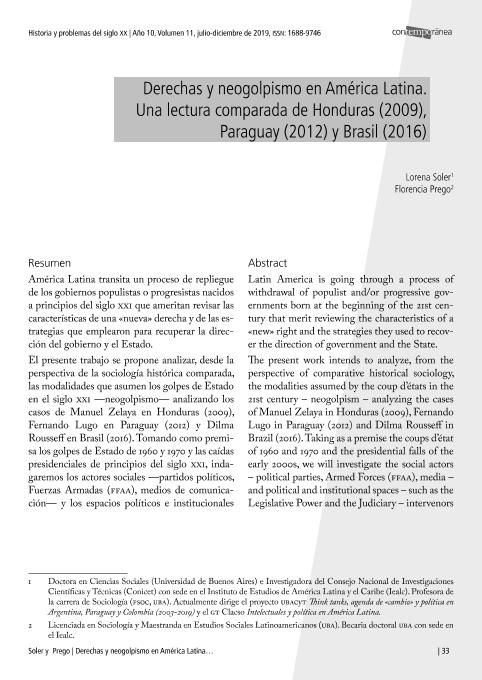Artículo
América Latina transita un proceso de repliegue de los gobiernos populistas o progresistas nacidos a principios del siglo xxi que ameritan revisar las características de una «nueva» derecha y de las estrategias que emplearon para recuperar la dirección del gobierno y el Estado. El presente trabajo se propone analizar, desde la perspectiva de la sociología histórica comparada, las modalidades que asumen los golpes de Estado en el siglo xxi —neogolpismo— analizando los casos de Manuel Zelaya en Honduras (2009), Fernando Lugo en Paraguay (2012) y Dilma Rousseff en Brasil (2016). Tomando como premisa los golpes de Estado de 1960 y 1970 y las caídas presidenciales de principios del siglo xxi, indagaremos los actores sociales —partidos políticos, Fuerzas Armadas (ffaa), medios de comunicación— y los espacios políticos e institucionales —como el Poder Legislativo y el Poder Judicial— intervinientes que nos permitan pensar el carácter novedoso de estos procesos. Partimos de la hipótesis que, en el marco de los gobiernos populistas o progresistas en crisis, las fuerzas de derecha se nuclearon en el espacio político parlamentario generando las condiciones de posibilidad para destituir a presidentes constitucionales con herramientas del orden jurídico y político democrático. Una «nueva» derecha que apeló tanto al Poder Legislativo como al Poder Judicial para efectivizar los golpes de Estado, clausurado un proceso de cambio y buscando instaurar un nuevo ordenamiento social. Latin America is going through a process of withdrawal of populist and/or progressive governments born at the beginning of the 21st century that merit reviewing the characteristics of a «new» right and the strategies they used to recover the direction of government and the State. The present work intends to analyze, from the perspective of comparative historical sociology, the modalities assumed by the coup d’états in the 21st century – neogolpism – analyzing the cases of Manuel Zelaya in Honduras (2009), Fernando Lugo in Paraguay (2012) and Dilma Rousseff in Brazil (2016). Taking as a premise the coups d’état of 1960 and 1970 and the presidential falls of the early 2000s, we will investigate the social actors – political parties, Armed Forces (ffaa), media – and political and institutional spaces – such as the Legislative Power and the Judiciary – intervenors that allow us to think about the novel nature of these processes. We start from the hypothesis that within the framework of populist and/or progressive governments in crisis, the right-wing forces were nucleated in the parliamentary political space, generating the conditions of possibility to dismiss constitutional presidents with tools of the democratic legal and political order. A “new” right that appealed to both the Legislative Power and the Judicial Power to effect the coups d’état, closed a process of change and seeking to establish a new social order.
Derechas y neogolpismo en América Latina: Una lectura comparada de Honduras (2009), Paraguay (2012) y Brasil (2016)
Fecha de publicación:
12/2019
Editorial:
Universidad de la República. Facultad de Humanidades y Ciencias de la Educación
Revista:
Contemporánea
ISSN:
1688-9746
Idioma:
Español
Tipo de recurso:
Artículo publicado
Clasificación temática:
Resumen
Palabras clave:
NEOGOLPISMO
,
DERECHAS
,
BRASIL/HONDURAS/PARAGUAY
,
AMÉRICA LATINA
Archivos asociados
Licencia
Identificadores
Colecciones
Articulos(SEDE CENTRAL)
Articulos de SEDE CENTRAL
Articulos de SEDE CENTRAL
Citación
Soler, Lorena Marina; Prego, Florencia; Derechas y neogolpismo en América Latina: Una lectura comparada de Honduras (2009), Paraguay (2012) y Brasil (2016); Universidad de la República. Facultad de Humanidades y Ciencias de la Educación; Contemporánea; 11; 2; 12-2019; 33-52
Compartir




